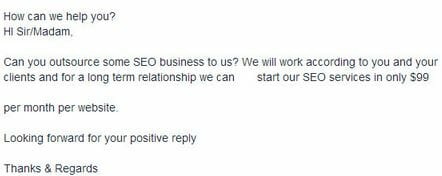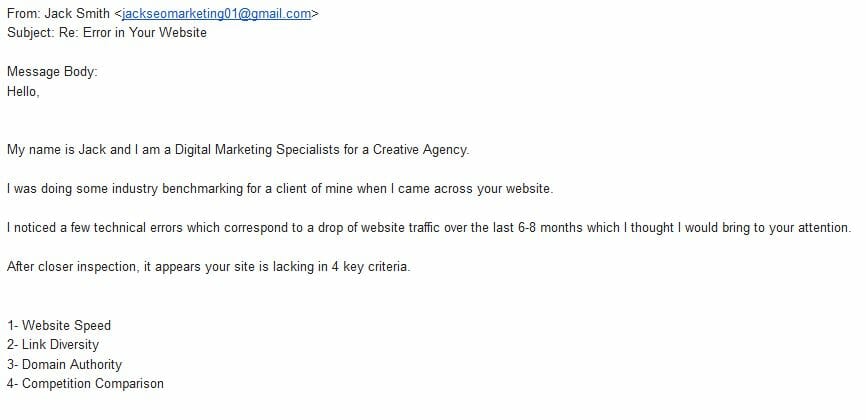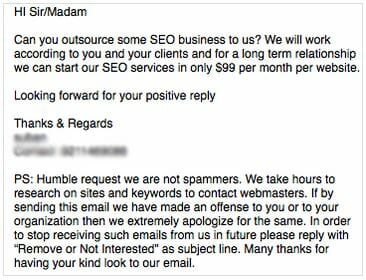
If you have an email address, then you are quite aware of the daily onslaught of spam emails. In fact, of the over 97 billion spam emails sent worldwide each day, the most common is the SEO spam email. These come in the form of a solicitation from some non-descript SEO company promising you overnight success and #1 Google rankings. These emails often include a blanket price for the services.
“$99 a month could land you at the top of Google results page in less than a week!”
Unfortunately, SEO scams come in all shapes and sizes. This means that you have to be very careful with any SEO business that randomly approaches you without you first initiating contact.
It is pretty easy to spot spams and scams if you work daily as an online marketing professional, but to those who are new to SEO, it may be a little more tricky. Many of these spam SEO emails point out errors on your website and promise to resolve the issues and leave you with a higher ranking. For the most part, this is just an attempt to scare you into taking action.
I am not here to tell you that every email advertising SEO services is spam. In some cases, these emails are a common marketing tool used by legitimate SEO companies trying to get business. But in most cases, they contain malicious phishing attempts or malware. Before deciding to go with any SEO agency you should always conduct research to ensure they are the best fit for your business.
WHAT DOES SEO SPAM EMAIL LOOK LIKE?
The SEO industry is overwhelmed with scammers trying to take advantage of website owners who do not know much about search engines. In fact, these scammers have given the SEO industry a bad name because so many people have been burned by them in the past.
To help you recognize these spammers, I will share a few examples that Raincross and our clients have received so I can point out common traits that many of these messages will have.
1. Bad Grammar and Awkward Formatting
This is an example that was recently sent to us. The email includes obvious formatting errors, missing punctuation and missing capitalization. These are all signs that this is not legitimate. Spam emails lack finesse and are oftentimes a bit pushy.

2. Generic Email Account
In this example, the fact that the unsolicited message is from a Gmail account should throw up an immediate red flag for you. Spammers often use generic Gmail or Yahoo accounts because it adds a layer of anonymity that makes it hard for any spam complaints to actually come back and harm their domain.

A real SEO company offering valuable services would never spam you like this and if for some reason they did send an unsolicited email, it certainly wouldn’t come from a Gmail account.
3. Blanket Rate and Empty Promises
Here is one that a client recently received. At first glance, this one almost seems legit, but there is so much wrong with it.

First, any SEO consultant who quotes you a blanket rate in an unsolicited email without any knowledge of your business, industry, competitors, geographical reach, website, or content is suspect. SEO services are not universal across all websites and you cannot optimize all websites within the same amount of time.
In addition, the amount of $99 is extremely low and well below the industry standard. A quality SEO consultant would never promise to do all of the SEO work for an entire month at a low rate of $99.
WHAT IS THE RISK?
The best case scenario is that you accidentally find a company that is legitimate and does decent work. The worst case scenario is you give scammers access to our website or tell them they can get to work and they cause irreparable damage in the form of penalties in Google, hacked sites and more.
While these emails are not always fake, about 99.99% of the time they are. You can also find out a lot about a company and their credibility by conducting a Google search. Look for reviews, complaints and whether or not a company even has an online presence.
SHOULD I RESPOND TO SEO SPAM?
Typically, your email company will filter these spam emails to your Junk Mail. In the event that it makes it to your inbox or you see it while scouring the junk folder, keep in mind that the best response when receiving these emails is no response at all. If you respond, the spammer will continue to solicit you and the influx of spam emails will grow exponentially. Instead, block the spam comments on your website and in your email. However, no matter how well established your website is you will still get spam emails trickling in from time to time.
The best defense against these spammers is knowledge. The more educated you are about SEO and internet marketing, the less likely you will be to fall for these tricks. You do not need to be an expert, but knowing the basics of how SEO and SPAM works will go a long way to protecting yourself and your business.





About The Author: Mysti French
Mysti French is a rockstar content writer! Before joining Raincross, she wrote and developed site content for such sites as Organize.com, MonkeySports, Marketing Instincts and Brenner-Feidler.
Mysti grew up in San Diego before moving to Perris, CA. She graduated from Cal State Hayward (later changed to Cal State East Bay) with a BA in English and Political Science.
More posts by Mysti French